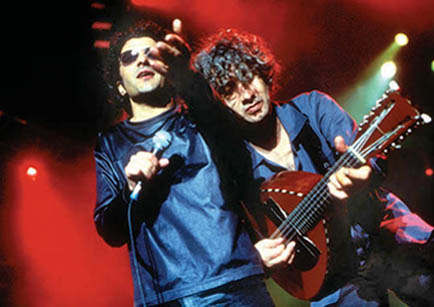Rachid Taha: Rock'n'Raï
Many artists - from the late Israeli diva Ofra Haza to Algerian pop-raï star Cheb Khaled - have taken the traditional sounds of the Middle East and "updated" them into hits on the dance charts. Yet few of these artists have married this exotic rhythm to an even more aggressive sound. Algerian-born singer Rachid Taha has done just that - creating a true fusion between raï and rock and other world music styles.

It's a sound that can be heard in discos from Algeria to Turkey and beyond. Its foundation is the complex rhythms of North Africa and the Middle East. Yet, these beats have been transformed by synthesizers, drum machines, raucous guitars and electronic sampling. The result is a dance music that has proven immensely popular with contemporary audiences - yet has its roots in some of the world’s oldest music.
Bazaar coincidence
In many ways, this Middle Eastern dance music has the flavor of the bazaar to it. A city's market brings flavors from all over the world to one spot, where consumers can take a bit of the world home with them without ever leaving the city. Pluck an electric guitar from one stall, the sampled voice of a call to prayer from another, and a drum machine from a third - and there you have it. Though this "bazaar" approach - and its many offshoots and hybrids - has shaped North African and Middle Eastern dance music, it has made inroads into creating larger audiences.
In fact, Western musicians such as Sting have used that same "bazaar" approach - as the British singer did on his "Brand New Day" album by enlisting raï superstar Cheb Mami to sing with him on the song, "Desert Rose".
Made in France
Enter Algerian-born singer/songwriter Rachid Taha - who is determined to pluck the rhythm and energy of North African dance music out of the bazaar and into the rock and pop charts. The 44-year-old Taha insists that his music is not raï - but, instead, a fusion of this regional music with harsher sounds of mainstream rock and punk and the energy modern dance music.
Taha's family moved from Algeria to Lyons, France in the late '60s. There, the future musical pioneer experienced the chilly and often marginal experience of Algerian immigrants to France. He worked in a series of menial jobs - including dishwashing and factory work - before starting a band called CARTE DE SÉJOUR (RESIDENCE CARD) in the '80s.
The sound of success
CARTE DE SÉJOUR was a highly successful project for Taha. In the grand French tradition of mixing radical politics in with pop music (including Serge Gainsbourg's reggae version of "Le Marseilles"), Taha's group used their Arab-influenced rock to describe the immigrant experience in France.
When CARTE DE SÉJOUR broke up in 1989, however, Taha continued his musical explorations with a series of solo albums. These releases ranged from more explicitly political combinations of rock and raï ("Barbès") to a conscious updating of older Algerian songs ("Diwân") to a melodic fusion between other world cultures and dance music ("Olé Olé"). What unites all of these records is Taha's willingness to experiment with different sounds from funk to punk.
Between a rock and a pop chart
Taha's most radical exploration was the 2000 classic, "Made in Medina". Recorded in various locations - from New Orleans to Paris to London - Taha's "Made in Medina" opens up the music of North Africa to the world - including a moody duet ("Ala Joukoum") with Fema Kuti, the son of African pop/rock superstar Fela Kuti.
With its driving rock beats and straightforward guitars, Taha seemed correct in telling one interviewer that "It's a rock album. I like rock, I like the feel of it, the feel of punk, and it works well with North African music". Though Taha has returned to his roots at times (including a collaboration with raï superstars Cheb Khaled and Faudel called "1, 2, 3 Soleils"), he seems truly committed to expanding the range of sounds and styles in his music.
"Live" Wire
Perhaps the best evidence of this is Taha's 2001 concert album, "Rachid Taha Live". Taking songs from many of his earlier records, Taha manages to push them even further into the realm of Western rock - without ever forgetting the foundation of his sound. A song such as "Foqt Foqt" features an almost heavy metal riff over a dense layer of rhythm and melody. "Barra Barra", on the other hand, is a combination of American funk and soul with North African rhythm.
The result is a music that does not merely translate the sounds of raï and other Middle Eastern musical forms to other audiences. Rather, Taha's music is truly multi-lingual. It speaks to many musical cultures, without betraying or misunderstanding any of them. In this way, Rachid Taha is truly among the most "global" of world music artists.
Richard Byrne
"The Globalist", August 24, 2002